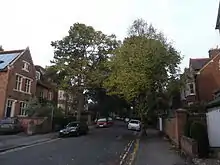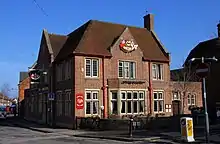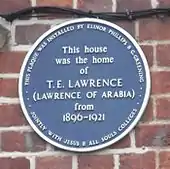Polstead Road
Polstead Road is a residential road that runs between Kingston Road and Hayfield Road to the west and the Woodstock Road to the east, in the suburb of North Oxford, England.[1] Halfway along it forms the southern junction of Chalfont Road. The road is probably named after the village of Polstead in the county of Suffolk.

Overview
The houses in Polstead Road were designed by Harry Wilkinson Moore and built between 1887 and 1894.[1][2]
St Margaret's Institute Community Centre[3] was the first building constructed on Polstead Road, following a subscription by parishioners of St Philip and St James Church in 1889 "for the building of a Working Men's Institute, 'to provide rational amusement and instruction for working men of any creed, sect, or opinions, who may thus be kept out of public houses'".[4]

The Anchor Inn[5] is located at the corner of Hayfield Road and Polstead Road at the western end.


The Lawrence family
The most well-known resident was T. E. Lawrence (1888–1935), later known as 'Lawrence of Arabia'. The son of Thomas Chapman (1846-1919; who became, in 1914, Sir Thomas Chapman, 7th Baronet), an Anglo-Irish nobleman, he was brought up in a house (No. 2) on this road and a blue plaque records the fact.[6][7] The future Sir Thomas Chapman, the 7th Baronet of Killua Castle in County Westmeath, Ireland, separated from his wife to live with his daughters' governess, Sarah Junner, also known as Sarah Lawrence. They had five sons and the couple lived under the names of Mr and Mrs Lawrence, moving to No. 2, Polstead Road in the summer of 1896 with the aim that the children could receive a good education for a reasonable cost. T. E. Lawrence attended the City of Oxford High School for Boys in central Oxford. Here also was born his youngest brother, A. W. Lawrence, who went on to become the Laurence Professor of Classical Archaeology at Cambridge University in the 1940s.
The house is a substantial semi-detached red-brick house that had been built approximately six years before the Lawrences moved there. They built a bungalow in the garden especially for Lawrence because the house was not large enough to accommodate the entire family. 2 Polstead Road remained the Lawrence family home until 1921. Lawrence was in residence when he departed for the First World War.
In January 2017, it was reported that Oxford City Council had failed to gain Grade II listed status for the Lawrence home, leaving its future in doubt.[8][9]
The house was offered for sale in 2018 for £2.95 million.[10]
References
- Hinchcliffe, Tanis (1992). North Oxford. New Haven & London: Yale University Press. pp. 79, 85–86, 123, 212, 235. ISBN 0-14-071045-0.
- Sherwood, Jennifer; Pevsner, Nikolaus (1974). The Buildings of England: Oxfordshire. Penguin Books. p. 321. ISBN 0-14-071045-0.
- "St Margaret's Institute Community Centre". 30 Polstead Road, Oxford, UK.
{{cite web}}: CS1 maint: location (link) - Robinson, Catherine; Buxton, Elspeth (1993). Hayfield Road — Nine hundred years of an Oxford Neighbourhood. Oxford: C. Robinson. ISBN 978-0-9522401-0-5.
- "The Anchor Inn". www.theanchoroxford.com. Oxford. Retrieved 16 August 2021.
- Warr, Elizabeth Jean (2011). The Oxford Plaque Guide. pp. 71–74. ISBN 978-0-7524-5687-4.
{{cite book}}:|website=ignored (help) - "SP5007: Blue plaque, 2 Polstead Road, Oxford". UK: Geograph. Retrieved 6 May 2011.
- The Sunday Telegraph [non-internet, paper only], Sunday, 22 January 2017.
- Oliver, Matt (26 January 2017). "Anger at decision not to protect the home where TE Lawrence grew up". Oxford Times. p. 7.
- Fraser, Isabelle (8 February 2018). "For sale: the childhood home of Lawrence of Arabia". Daily Telegraph. UK. Retrieved 7 January 2020.